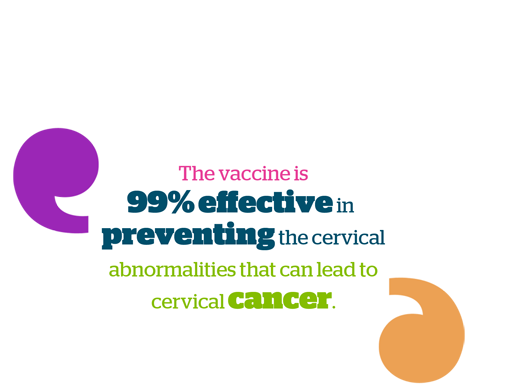All girls aged 12 to 13 are offered the HPV (human papillomavirus) vaccination as part of the NHS childhood vaccination programme. The vaccine protects against cervical cancer. This is a serious and potentially life threatening disease. It's usually given to girls in year eight at schools in England.
The HPV vaccine consists of two injections into the upper arm spaced at least six, and not more than 24 months apart.
"It's a safe vaccine and there are very few girls who aren't suitable for HPV vaccination."
However, special precautions may need to be taken if the girl being vaccinated has certain health conditions, or has ever had a severe allergic reaction (anaphylaxis). Talk to your school nurse if you are worried.
Research has indicated that the HPV vaccine protects against cervical cancer for at least 20 years.
How is HPV infection spread?
HPV is spread through skin contact, often during sex. Using a barrier form of contraception can reduce your risk of becoming infected. However, as condoms do not cover the entire genital area and are often put on after sexual contact has begun, a condom is no guarantee against the spread of HPV. For most people, HPV infections come and go without any symptoms. Sometimes, the virus may remain inactive for months after infection.
Although most girls don't start having sex until after they're 16 years of age, it's important to get protection early enough and the very best time is in the early teenage years.
"The HPV vaccine does not replace the importance of safe sex or the need for regular cervical screening."
Discuss this with your school nurse.
Do I have to have the vaccine?
You will have to sign a consent form before you can be vaccinated. Make sure you have thought things through, the HPV vaccine has a good safety record and will protect you against cervical cancer for many years.
"Speak to your school nurse if you want more information, on her own, or with your parent or carer if you prefer."
The vaccine has undergone rigorous safety testing as part of the licensing process required in the UK and other European countries.
How effective is the HPV
vaccine?
The vaccine is 99% effective in preventing the cervical abnormalities that can lead to cervical cancer caused by HPV types 16 and 18*.
* Source: www.gov.uk
Are there any side effects?
As with most vaccines, the most common side effect is mild to moderate swelling, redness and pain at the site where the injection is given. Other mild side effects might be slightly raised temperature, sickness and muscle aches. Very rarely, some people have an allergic
reaction soon after immunisation. This reaction may be a rash or itching affecting part or all of the body. It is not a reason to stop having HPV vaccinations.
Can girls who missed HPV vaccination still have it?
Yes, if a girl misses either of her vaccinations, for whatever reason, she can speak to her nurse or GP about making another appointment, ideally as close as possible to the original one.
Girls can have the HPV vaccination on the NHS up to the age of 18. Girls who have the HPV vaccination after the age of 15 will need three doses as the response to two doses is not so good
in older girls.






